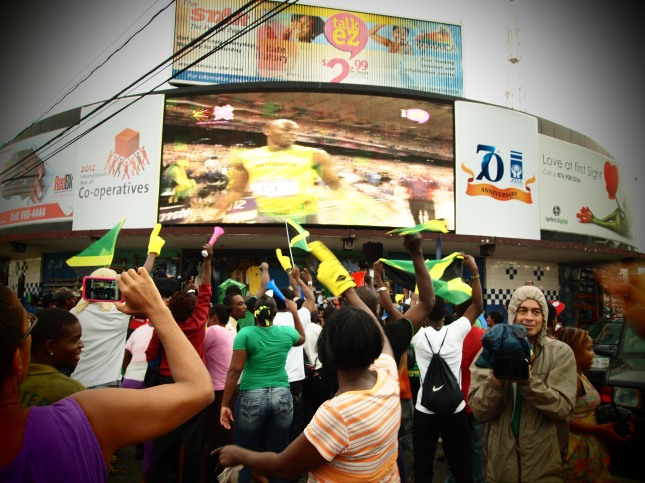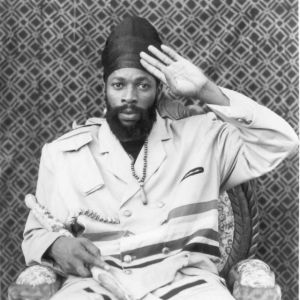
Since LargeUp posted a big ol’ feature on Alric and Boyd, I thought it might be a good idea to revisit a piece I wrote for the venerable UK zine No Ice Cream Sound around this time last year. Alric and Boyd are a pile of fun to interview–and their music tastes are pretty fun too. Withut further ado, here’s “Electronic in the Dance”:
Alric and Boyd have a passion for music. They’ve produced dancehall and R&B, working recently with Jill Scott. They’re linked with Max Glazer’s Federation sound, crafting amazing mixtapes. But they really get animated when talking about doing remixes for Acid House creator DJ Pierre and the fact that Carl Cox is slated to perform in Barbados for the second Music Factory Pop, Dance and House Festival in May 2012. Alric and Boyd played the first edition in November 2011.
All in all, it’s been twenty years that Alric Anglin and Boyd James have been in the club scene and on radio, helping to bring electronic dance music to Jamaica. Describing themselves as a team, they’ve worked side by side since 1992. Djing since 88 and 84 respectively, however, they can chart just how house music and other electronic forms have been bubbling in the Jamaican scene. Yes, Boyd admits, “The scene is small, but it is there. There is an awareness.”
The prolific nature of reggae and dancehall production tends to obscure the fact that music lovers in Jamaica have significant variety in their musical diet. “We listen wide, not deep,” laughs Alric, in one sentence exploding any idealized view reggae lovers might have about the island and its music. “That’s where you find that we started to push the envelope with house music, with electronic dance music and found that there is a market.”
“Jamaican music is not just dancehall and reggae,” says Boyd, lowering his voice, “And I will tell you something that might be quite shocking. The UK reggae scene is way deeper than the Jamaican reggae scene.” The thing is, from the 1960s through to the 80s, a lot of reggae music was exported to the UK, because that’s where the money was. “We would get what you might call the ‘what left’,” laughs Boyd. The phenomenon can perhaps be linked to the fact that the Jamaican British population have been interested in music from home. For this reason, and also the fact that reggae music and dancehall was long looked down upon (not even used in tourist advertising until 1984), Jamaicans on the island tend to cultivate a varied taste in music. This has exposed non-Jamaican UK listeners to heaps of Jamaican music, but it has also allowed other types of music to flourish in Jamaica. One only has to look at the rapturous reception to Celine Dion at this year’s Jamaica Jazz and Blues Festival to know that there’s a wide audience on the island for other types of music.
“We were always exposed to American and UK music, based on the influences on our culture,” says Boyd. After all, in the 1960s, 70s and 80s, it was mostly international music played on the radio in Jamaica. “It is in our DNA that we have an appreciation for country and western to classical to R&B to rock to hip hop.” Specifically, however, in 1981 there was a radio show on what is now FAME fm, then Capitol Stereo, called “Disco Mania”. “It was almost a five-hour radio show. It was the biggest thing for us,” recalls Boyd. The hits from that show trickled down into the party scene. Rae Town’s still-running party was founded in 1982, and showcased a lot of disco tunes—as it still does today.
Alric remembers sitting, listening with ear to the radio, to “Disco Mania” playing some of the underground sounds from New York. The radio show lasted ten years, and during that time Boyd ended up in New York, at NYU studying audio technology during the day and going out to now-legendary clubs from Studio 54 to Tunnel. He did an internship with Sly and Robbie, and then upon return to Jamaica, he began working with then-DJ Alric in 1992, and was able bring music to the table that was at the time unavailable in the Caribbean. “We started to develop a synergy and started to take off,” says Alric.
They’d drop the bass of pop tracks and introduce underground house and techno music gradually, making sure that the crowd wouldn’t lose interest. Almost like an inverted dubplate, Alric and Boyd would play with the riddim instead of the lyrics. And like all Jamaican selectors, they actively thought of the massive at all times, they were well aware of the fact that they needed to please: “If you can rock a Jamaican crowd, you’re a good DJ,” laughs Boyd, “In a night club where people are paying money, we had to keep the vibes. A DJs job is to convert and make memories. If you can’t remember what a DJ plays, you’re not a good DJ.”
Their radio show, aptly titled “The Edge” began in October of 1995 and took up where “Disco Mania” left off, Alric and Boyd playing the same format as they did in the club. “We went deeper into the house, deeper into the progressive,” says Boyd. “You would hear jungle, UK garage, 2 step, the new techno, hard house coming out of Germany, we were banging it,” continues Alric. But back in the 90s, there was no quick download of these tracks. Alric and Boyd needed to struggle and BUY these records. Sure, they got some promos, but they’d also get records from visiting DJs and vacationers who would come and play their house parties and club gigs. The show ran strong until April of 2009, when the pair moved on to other projects.
As for the place of Alric and Boyd’s favourite music in Jamaica today? “It still needs a kick. People who put on big parties here are afraid of electronic dance music because in the 80s and 90s it would come with a stigma—it was gay music of white people music or drug music. Now that it has blown sky high, I think they are trying to see how they can reintroduce it into the market.”
And how do they feel about folks like Bob Sinclair and Diplo who have come to Jamaica to draw on local music and enhance their electronic dance music productions? “Jamaicans can be close minded,” says Boyd, “But these people are introducing us to a new market, so don’t fight it. But there are pros and cons. There are producers who do come in and take. But the good side is exposure.”
And with festivals like the Barbados Music Factory receiving the blessing of London dance music stalwart Ministry of Sound, Alric and Boyd don’t think it’s unrealistic to think that there might be some potential for a bit of Ibiza in the Caribbean. After all, the region has the beautiful beaches and amazing weather. But, most importantly, a commitment to music that makes a crowd move. “It must have a vibes,” says Alric. Boyd nods in approval.




